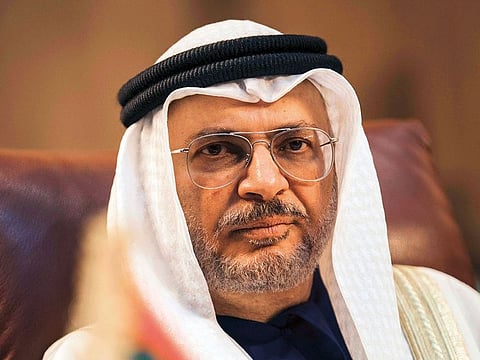Gargash: Iran and Turkey should respect sovereignty of other states
Says UAE doesn’t seek confrontation with them, out of its belief in constructive dialogue

Dubai: The UAE will remain committed to its rational and balanced policy and its belief in constructive dialogue and positive diplomacy as key to achieving peaceful resolution of conflicts in the region, a top UAE official said.
In his keynote address during the 7th Abu Dhabi Strategic Debate organised by the Emirates Policy Centre, Dr Anwar Gargash, State Minister for Foreign Affairs, said Iran and Turkey should respect the national sovereignty of others and stop interfering in their domestic affairs.
“The UAE has long adopted an approach that promotes collaboration instead of confrontation, tolerance instead of extremism, and constructive pragmatism instead of ideology,” he said.
“Iran and Turkey have become increasingly aligned in the region in using foreign interference as a tool to advance their expansionist agendas,” Dr. Gargash said, adding bringing an end to this interference will also make it easier to achieve peaceful solutions in the region.
No confrontation
The UAE does not accept the destabilising nature of Tehran’s and Ankara’s policies, however, does not seek confrontation with them, out of its belief in constructive dialogue and positive diplomatic engagement towards peaceful solutions.
“The UAE remains committed to working towards political solutions to conflicts, guided by its long-standing commitment to multilateralism, anti-extremism, respect for national sovereignty, peaceful resolution of conflict, good governance and sustainable development,” he added.
On the UAE’s decision to establish ties with Israel, Dr. Gargash said it was motivated by the UAE’s commitment to shaping a new and better future for the region.
“It was a sovereign national decision and was not targeted at any other country,” he emphasised.
Addressing challenges
Dr, Gargash stressed that the UAE will work diligently to strengthen multilateralism and the rules-based order. “It is the only effective way of addressing challenges such as economic and health crises, climate change, terrorism, poverty and recurring armed conflicts. A multilateral approach is clearly in the interest of small states, but ultimately it is also in the interest of great powers: there can be no doubt that both the US and China have thrived under the international order of the last 75 years.”
He reiterated the UAE’s rejection of all forms of extremism and the use of Islam under the banner of extremist movements. “We must distinguish between the utilisation of Islam as a political tool and Islam as a universal religion. Islam must not be tainted by extremism and violence anywhere in the world.”
“These extremist, transnational ideological movements do not represent Islam in any way. They fuel the use of violence in pursuit of political goals. They are a threat to all open and tolerant societies,” he added.
Sign up for the Daily Briefing
Get the latest news and updates straight to your inbox






